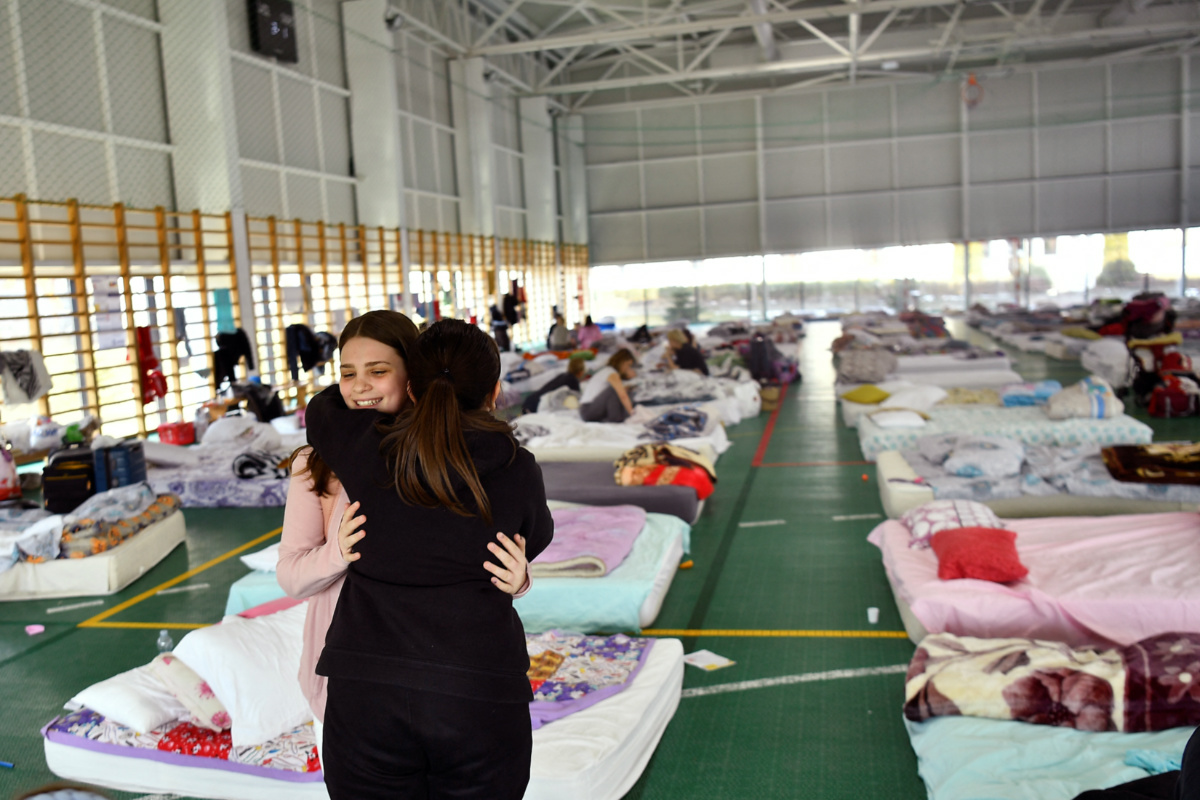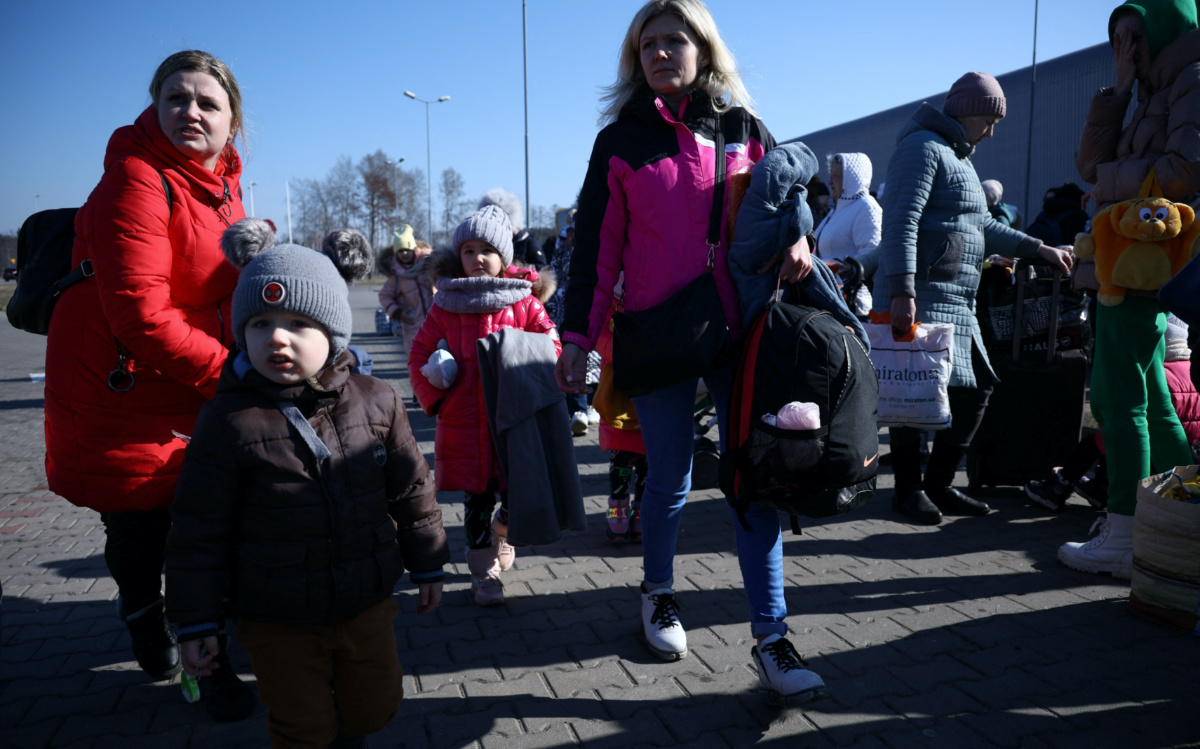Przemysl, Poland/Palanca, Moldova
Reuters
Nearly three weeks into the war, the number of Ukrainians fleeing abroad passed three million on Tuesday, the United Nations said, as people escaped fighting and Russian bombardment.
Some 3,000,381 people have so far left Ukraine, data from the UN Refugee Agency, UNHCR, showed. It is basing its aid plans on four million refugees but has said the figure will likely increase.

Friends greet each other at Dumbraveni sports arena which has been converted to a temporary shelter, after they fled Ukraine separately through the Siret border crossing in Romania, following Russia’s invasion of Ukraine, in Suceava, Romania March 15, 2022. REUTERS/Clodagh Kilcoyne
After Sunday’s Russian strike on the Yavoriv military base near Lviv, some people from western Ukraine have now joined the refugee flow across the border.
“Everybody considered West Ukraine to be quite safe until they started striking Lviv,” said Zhanna, 40, a mother from Kharkiv, who was heading to Poland to reunite with her godmother who left Ukraine a few days earlier.
“We left Kharkiv for Kirovohrad,” she said at the train station of Przemysl, the nearest town to Poland’s busiest border crossing with Ukraine. “We wanted to stay there. We did not want to go abroad.”
“Then they started striking Kirovohrad, they started striking Lviv and it is complicated to avoid bombs with a small child,” she said, adding that her husband had stayed in Ukraine.
The vast majority of refugees are in countries bordering Ukraine – Poland, Slovakia, Hungary, Romania and Moldova – with over half of them, or 1.8 million, in Poland alone.
But a significant number of refugees are starting to move further west, with 300,000 individuals having gone so far to Western Europe, the UNHCR said on Tuesday.
“If we really show the best sides of ourselves in solidarity, we can manage [this challenge],” the European Union’s top migration official, Ylva Johansson, said in Brussels.
Her comments echoed the hallmark phrase “Wir schaffen das” (“We can manage this”) of Germany’s then-chancellor, Angela Merkel, at the height of Europe’s previous major influx of refugees in 2015-16 when more than a million people fleeing the war in Syria reached the EU.
“I want to live in Ukraine but I can’t”
In Romania, Ukrainian women and children, some clutching teddy bears, continued to stream through the Siret border crossing where temperatures dropped to minus two degrees Celsius overnight.
Pulling suitcases and carrying backpacks, they were met by Romanian firefighters and volunteers, who carried their belongings to buses transporting them onwards.

People walk in front of the reception centre for refugees, following the Russian invasion of Ukraine, in Nadarzyn, Poland, on 14th March. PICTURE: Reuters/Kacper Pempel/File photo.
Further south at Isaccea, a busy border crossing on the Danube, Tanya, from Mykolaiv in southern Ukraine, said she was fleeing to save her child’s life.
“On the way here I cried because I love my country. I want to live in Ukraine but I can’t. Because they are destroying everything now,” she said, fighting back tears.
Russia denies targeting civilians, describing its actions as a “special military operation”. Ukraine and Western allies call this a baseless pretext for Russia’s invasion of a democratic country of 44 million.
We rely on our readers to fund Sight's work - become a financial supporter today!
For more information, head to our Subscriber's page.
In Moldova, one of Europe’s poorest countries, some refugees were returning home to Ukraine, either to fetch more belongings or hoping to return for good.
Liudmila, who did not give her last name, was going back to Ukraine to fetch school supplies for her children in Chisinau, Moldova’s capital.
“On Monday they began learning online and that’s why I should take some things for them – books, for writing,” she said.
The UNHCR says those fleeing early in the conflict mostly had resources and contacts outside Ukraine, but now many of the refugees had left in a hurry and were more vulnerable.
“We see a lot of elderly people and a lot of persons with disabilities, really people who were expecting and hoping until the last moment that the situation would change,” said Tatiana Chabac, an aid worker with the UNHCR.
Another woman, who did not give her name, was going back to Odessa with her toddler. “We want to go home,” she said as she crossed the border into Ukraine.
– Additional reporting by BRANKO FILIPOVIC in Siret, and FEDJA GRULOVIC in Isaccea, Romania, PAWEL FLORKIEWICZ in Warsaw, Poland, KRISZTINA THAN in Budapest, Hungary, JAN LOPATKA in Prague, Czech Republic, GABRIELA BACZYNSKA in Brussels, Belgium, and STEPHANIE NEBEHAY in Geneva, Switzerland.






